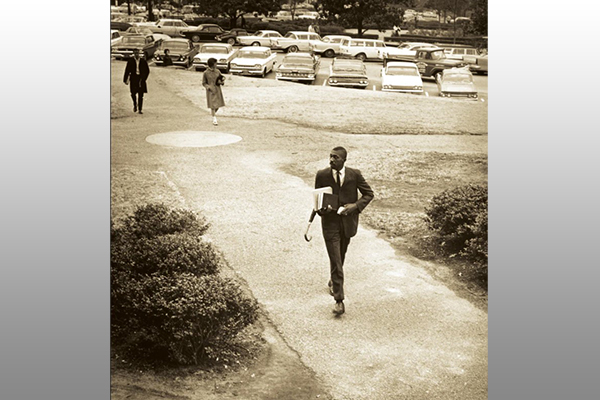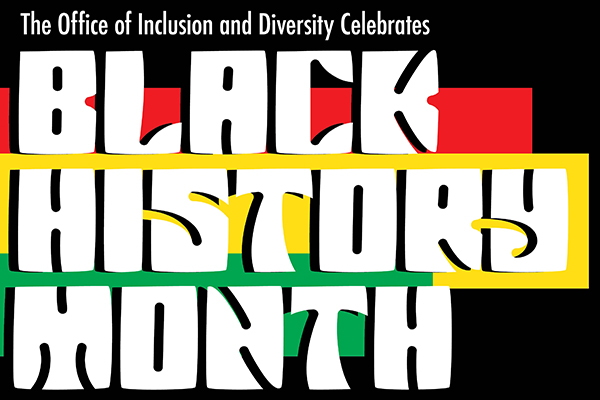Auburn University honoring contributions, achievements of African Americans through array of events during Black History Month
Article body
Auburn University and the Office of Inclusion and Diversity, or OID, are honoring the legacies, contributions and achievements of African Americans throughout Black History Month via an array of events designed to educate, create fellowship and call for continued progress.
Auburn organizations are hosting more than a dozen events, including ones organized by OID, the Black Student Union, Student Involvement, the Black Graduate and Professional Student Association, OID’s Cross-Cultural Center for Excellence and OID’s Women’s Initiatives and Gender Equity sub-units. In addition, the National Pan-Hellenic Council, College of Nursing, Financial Management Association, National Association of Black Accountants, the International Cultural Center and Women in Sports are hosting events.
The collaborative efforts of the groups and organizations represent a unified partnership among Auburn student, administration, faculty, professional, alumni and community entities to call attention to Black history and heritage this month.
“Black History Month is one of the many times during the year where we celebrate and honor the achievements, history and experiences of Black Americans who have been central in our nation’s history,” said Taffye Benson Clayton, associate provost and vice president for inclusion and diversity at Auburn University. “It is critical that we deepen our understanding of the Black experience and create space to celebrate the perseverance, brilliance, strength and beauty of a people that contributed and still contribute so meaningfully to the fabric of American culture.”
Black History Month is featured across the nation throughout February, its importance paramount to the quest to promote diversity, equity and inclusion, or DEI.
“Black History Month remains important because it allows us to learn more about Black Americans’ lives, experiences and contributions to the U.S. and beyond,” said Austin McCoy, an assistant professor of history in Auburn’s College of Liberal Arts. “What else is important about this month, and Black History, generally, is that it provokes everyone to ask questions about conventional narratives of the U.S. that emphasize notions of uninterrupted progress, for example, the notion that the U.S. is constantly striving toward a more perfect union. While many Americans believe this, the study of Black history shows a more complicated picture emphasizes this country’s fits and starts and peaks and valleys when it comes to living up to civic ideals.”
Auburn has reaffirmed its commitment to DEI efforts in recent years through the naming of buildings in honor of African American graduates and securing the legacy of Harold A. Franklin, who integrated the university in 1964.
“We are so fortunate to be an institution with the collaborative spirit that the Auburn Family has,” Clayton said. “Collectively, we have embraced diversity, equity and inclusion as core to advancing institutional strategic plan goals and our institutional mission. The Office of Inclusion and Diversity has partnered with multiple departments and teams on campus toward creating a diverse, inclusive and equitable campus. These partnerships have built momentum and evolved systemic and policy-based efforts that maximize our university's potential and create opportunities for students, faculty, staff and alumni to flourish and become leaders who change the world.
“We are continuously inspired by the commitment of faculty, staff, students and alumni alike in this journey.”
Those strides are steps in an ongoing journey toward equity for the university and the Auburn Family.
“I think Auburn University is now largely in-step with most major research universities around the nation,” said Guy Emerson Mount, an assistant professor of history, who stressed there is “an admittedly low bar” for current national initiatives. “President [Jay] Gogue is truly a remarkable president and a genuinely caring human being who I know is deeply committed to this issue.
“Overall, universities need to think far beyond the ‘town and gown’ model and make transformative justice nationally and internationally central to their institutional missions. This is not an ‘add-on’ that universities should subsume. It requires a transformation of their very raison d’être.”
While progress has been made in recent years, the university and its constituents recognize the need for a continued commitment to equality for all.
“As a land-grant institution, Auburn has a responsibility to serve the people of Alabama, the country and the world and to create an inclusive campus where people can thrive,” Clayton said. “The administration and leaders from across colleges, schools, units, departments and our entire university are collaborating to support the Auburn Family and ensure that Auburn is an equitable and inclusive environment. This work involves a variety of educational engagements, policy updates, honoring trailblazing individuals through building namings and each college working on identified goals and strategies to advance inclusion and diversity.
“This spring, we encourage faculty, staff and students to share their feedback in our 2022 Campus Climate survey, participate in our programming opportunities and get involved in our many on-campus opportunities. Please remain connected to these and many other updates through the Auburn University Diversity, Equity and Inclusion landing page.”
That DEI landing page includes a timeline chronicling the legacy of Auburn’s trailblazers, starting with Franklin’s iconic first steps on campus nearly 60 years ago. That journey continues this month as the Auburn Family comes together to pay tribute to the contributions of African Americans to the university and the country.
“It will be important for the members of the university community to listen to Black students, both undergraduate and graduate, and to continue to address their concerns,” McCoy said. “Black people like scholar W.E.B. DuBois, grassroots organizers like Ella Baker and Fannie Lou Hamer, and even Dr. Martin Luther King Jr. have argued for the importance of ensuring social and economic justice at home and enabling it abroad, independent of U.S. influence, as a prerequisite to fulfilling democratic ideals. We must challenge ourselves to take their visions more seriously. Their examples show we must organize our way to a better future.”
Creating an inclusive and welcoming environment for all, both on campus and in the community, remains a steadfast goal.
“Good things can happen when ordinary people of goodwill come together on a local level to imagine new worlds and commit to building those worlds together,” Mount said. “Another world is possible.”
Related Media
Media interested in this story can contact Communications Director Preston Sparks at (334) 844-9999 or preston.sparks@auburn.edu.
Auburn University is a nationally ranked land grant institution recognized for its commitment to world-class scholarship, interdisciplinary research with an elite, top-tier Carnegie R1 classification, life-changing outreach with Carnegie’s Community Engagement designation and an undergraduate education experience second to none. Auburn is home to more than 30,000 students, and its faculty and research partners collaborate to develop and deliver meaningful scholarship, science and technology-based advancements that meet pressing regional, national and global needs. Auburn’s commitment to active student engagement, professional success and public/private partnership drives a growing reputation for outreach and extension that delivers broad economic, health and societal impact.






